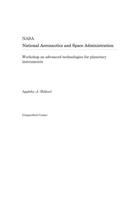
Workshop on Advanced Technologies for Planetary Instruments
Series:
NASA's robotic solar system exploration program requires a new generation of science instruments. Design concepts are now judged against stringent mass, power, and size constraints--yet future instruments must be highly capable, reliable, and, in some applications, they must operate for many years. The most important single constraint, however, is cost: new instruments must be developed in a tight
NaN
VOLUME
English
Paperback

NASA's robotic solar system exploration program requires a new generation of science instruments. Design concepts are now judged against stringent mass, power, and size constraints--yet future instruments must be highly capable, reliable, and, in some applications, they must operate for many years. The most important single constraint, however, is cost: new instruments must be developed in a tightly controlled design-to-cost environment. Technical innovation is the key to success and will enable the sophisticated measurements needed for future scientific exploration. As a fundamental benefit, the incorporation of breakthrough technologies in planetary flight hardware will contribute to U.S. industrial competitiveness and will strengthen the U.S. technology base. The Workshop on Advanced Technologies for Planetary Instruments was conceived to address these challenges, to provide an open forum in which the NASA and DoD space communities could become better acquainted at the working level, and to assess future collaborative efforts. Over 300 space scientists and engineers participated in the two-and-a-half-day meeting held April 28-30, 1993, in Fairfax, Virginia. It was jointly sponsored by NASA's Solar System Exploration Division (SSED), within the Office of Space Science (OSS); NASA's Office of Advanced Concepts and Technology (OACT); DoD's Strategic Defense Initiative Organization (SDIO), now called the Ballistic Missile Defense Organization (BMDO); and the Lunar and Planetary Institute (LPI). The meeting included invited oral and contributed poster presentations, working group sessions in four sub-disciplines, and a wrap-up panel discussion. On the first day, the planetary science community described instrumentation needed for missions that may go into development during the next 5 to 10 years. Most of the second day was set aside for the DoD community to inform their counterparts in planetary science about their interests and capabilities, and to describe the BMDO...
Price Comparison [India]
In This Series
Bestseller Manga
Trending NEWS




















